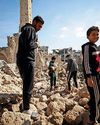
In reality, this offer took not just two weeks of talks to prepare, but nine years - since article 9 of the Paris agreement in 2015 made it clear that the rich industrialised world would be obliged to supply cash to developing countries to help them tackle the climate crisis.
When it finally arrived last Friday, the initial offer of $250bn a year by 2035 was widely derided as too low. Early the following morning, the countries upped the figure to $300bn, which ended up being accepted, albeit amid acrimony and cries of "betrayal".
Even in signing the deal, rich countries prevaricated - the money could come not just in the form of the grants and very low-interest loans that developing countries need, but some could also come from a "wide variety of sources, public and private, bilateral and multilateral and alternative sources". Money will be "mobilised" rather than provided - a nice distinction that allows for the inclusion of private sector coinvesting to be counted alongside public money from government budgets and development banks.
Plus, rich countries will only have to "lead" in supplying this - some of the cash could come from big emerging economies, such as China or South Korea, or even petrostates such as the United Arab Emirates. And the headline figure of $1.3tn a year for developing countries by 2035 relies on the $300bn being supplemented with a much higher amount of private sector investment, and "innovative" forms of finance such as new taxes on fossil fuels and frequent flyers, none of which are close to being in place.
Denne historien er fra November 29, 2024-utgaven av The Guardian Weekly.
Start din 7-dagers gratis prøveperiode på Magzter GOLD for å få tilgang til tusenvis av utvalgte premiumhistorier og 9000+ magasiner og aviser.
Allerede abonnent ? Logg på
Denne historien er fra November 29, 2024-utgaven av The Guardian Weekly.
Start din 7-dagers gratis prøveperiode på Magzter GOLD for å få tilgang til tusenvis av utvalgte premiumhistorier og 9000+ magasiner og aviser.
Allerede abonnent? Logg på

The courts are pushing back. What if Trump defies them?
Years before he became US vice-president and advocated defiance of the courts over the Trump administration's blitz through the federal bureaucracy and constitution, JD Vance revealed his contempt for legal constraints.

'We're afraid' Can the tide be turned on surging gang crime?
The Operation Restoration Christian school sits amid a line of patched-up housing blocks and streetside cookshops in Trench Town.

Land grab Defiance in the face of 'Riviera' plan
One month after the announcement of a ceasefire between Israel and Hamas, the Palestinians of Gaza have begun improvising a new life amid the wreckage of the old.

The scandal of the radioactive chapatis
When details about a scientific study in the 1960s-in which Indian women in Britain were given radioactive food without their consent - became public, there was shock and anxiety. But what exactly happened?

Soul.survivors
De La Soul's return was shattered by the death of Dave 'Trugoy' Jolicoeur. Now a duo, they discuss grief, Gorillaz and never giving up

Annexation talk gives Canadians a reason to pull together
Alone figure takes to the stage, a giant maple leaf flag rippling on a screen behind him as he gingerly approaches the microphone.

Friend or foe? By meeting with the AfD, Vance clearly revealed US intentions
The Trump administration is making a big bet on Europe's hard right.

The race to commit an island to memory
Can virtual-reality cameras, 3D models and digital archives prevent Qikiqtaruk's history from slipping away?

A 32-minute boiled egg? Don't let science ruin the joy of home cooking
I remember making pearls of balsamic vinegar, my first and only foray into what is known as \"molecular gastronomy\", in 2013.

As US retreats, plan for a joint nuclear shield deserves consideration
The startling contempt for Europe's intensifying security concerns displayed by Donald Trump and his henchmen has brought an old, controversial question back to the fore: should Britain and France pool their nuclear weapons capabilities and create a Europe-wide defensive nuclear shield to deter Vladimir Putin's Russia, if the US reduces or withdraws its support?